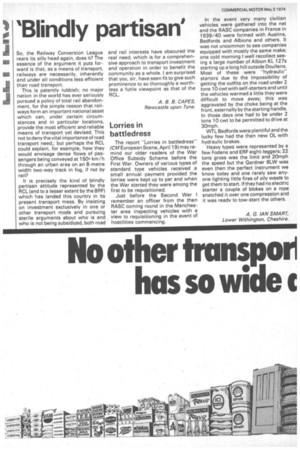'Blindly partisan'
Page 46

If you've noticed an error in this article please click here to report it so we can fix it.
So, the Railway Conversion League rears its silly head again, does it The essence of the argument it puts forward is that, as a means of transport, railways are necessarily, inherently and under all conditions less efficient than road transport.
This is patently rubbish; no major nation in the world has ever seriously pursued a policy of total rail abandonment, for the simple reason that railways form an important nationa I asset which can, under certain circumstances and in particular locations, provide the most efficient and reliable means of transport yet devised. This not to deny the vital importance of road transport need,; but perhaps the RCL could explain, for example, how they would envisage dense flows of passengers being conveyed at 150+ km/h through an urban area on an 8-metre width two-way track in fog, if not by rail?
It is precisely the kind of blindly partisan attitude represented by the RCL (and to a lesser extent by the BRF) which has landed this country in its present transport mess. By insisting on investment exclusively in one or other transport mode and pursuing sterile arguments about who is and who is not being subsidized, both road and rail interests have obscured the real need, which is for a comprehensive approach to transport investment and operation in order to benefit the community as a whole. I am surprised that you, sir, have seen fit to give such prominence to so thoroughly a worthless a futile viewpoint as that of the RCL.
A. B. B. CAPES, Newcastle upon Tyne.
Lorries in battledress
The report "Lorries in battledress" (CM European Scene, April 19) may remind our older readers of the War Office Subsidy Scheme before the First War. Owners of various types of standard type vehicles received a small annual payment provided the lorries were kept up to par and when the War started they were among the first to be requisitioned.
Just before the Second War I remember an officer from the then RASC coming round in the Manchester area inspecting vehicles with a view to requisitioning in the event of hostilities commencing. In the event very many civilian vehicles were gathered into the net and the RASC companies in France in 1939/40 were formed with Austins, Bedfords and Albions and others. It was not uncommon to see companies equipped with mostly the same make; one cold morning I well recollect seeing a large number of Albion KL 127s starting up a long hill outside Doullens. Most of these were "hydraulic" starters due to the impossibility of getting the outfits on the road under 2 tons 10 cwt with self-starters and until the vehicles warmed a little they were difficult to move away; this was aggravated by the choke being at the front, externally by the starting handle. In those days one had to be under 2 tons 10 cwt to be permitted to drive at 30mph.
VVTL Bedfords were plentiful and the lucky few had the then new CL with hydraulic brakes.
Heavy types were represented by a few Fodens and ERF eight-leggers; 22 tons gross was the limit and 20mph the speed but the Gardner 6LW was even then the perfect instrument we know today and one rarely saw anyone lighting little fires of oily waste to get them to start. If they had no electric starter a couple of blokes on a rope snatched it over one compression and it was ready to tow-start the others.
A. G. IAN SMART, Lower Withington, Cheshire.




























































































